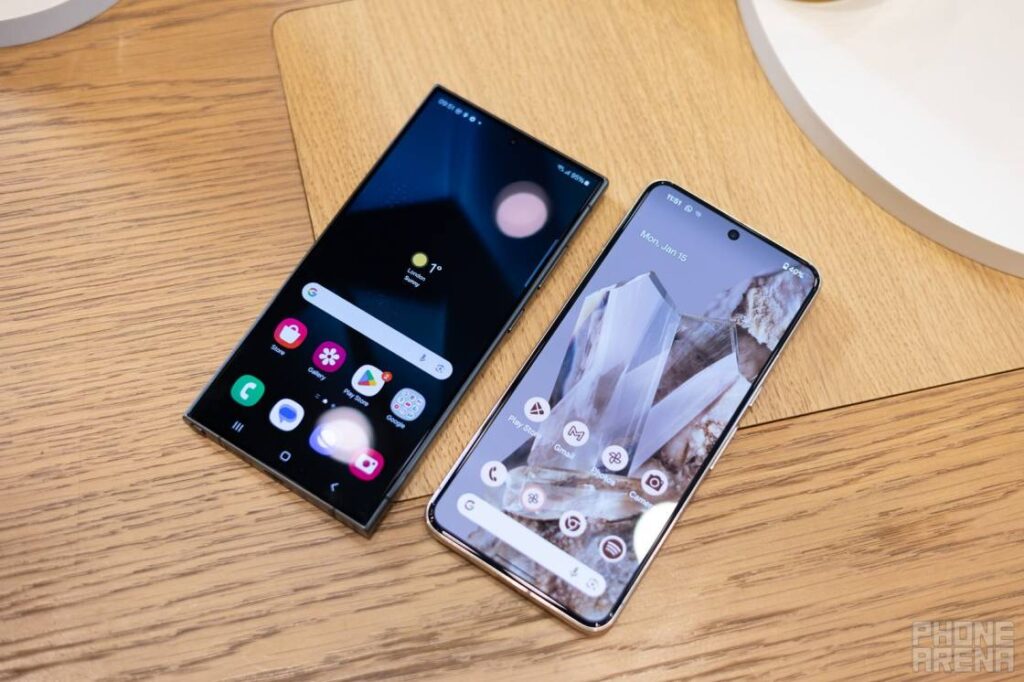Galaxy S24 vs Pixel 8 Comparison: The integration of artificial intelligence (AI) has become a crucial battleground for tech firms aiming to provide cutting-edge user experiences in the constantly changing world of smartphone technology. At the vanguard of this technological arms race are Samsung’s Galaxy S24 and Google’s Pixel 8, which both have cutting-edge AI capabilities that might completely change how we interact with our gadgets. We’ll go into great detail comparing the AI power built into these two flagship smartphones in this blog article.
The AI Ecosystem(Galaxy S24 vs Pixel 8):

Google and Samsung have both made significant investments in building strong AI ecosystems to improve the functioning of their devices. Samsung’s exclusive AI platform, which is intricately woven into the operating system and apps of the smartphone, is utilized by the Galaxy S24. Conversely, the Pixel 8 leverages the capabilities of Google’s well-known artificial intelligence technology, such as the Google Assistant and a range of machine learning algorithms.
Camera Capabilities (Galaxy S24 vs Pixel 8):
The camera department of smartphones is unquestionably one of the main arenas for AI supremacy. The Pixel 8 and Galaxy S24 have sophisticated camera systems that are improved by AI algorithms. The flagship model from Samsung has a unique AI-driven camera setup that optimizes image quality, makes real-time adjustments based on environmental circumstances, and allows for additional shooting modes like portrait enhancement and night mode.
In the meantime, Google’s AI-powered Pixel 8 is well known for its remarkable computational photography capabilities. Even in difficult lighting situations, the Pixel’s camera AI produces amazing performance in tasks like image processing, scene identification, and computational photography techniques like HDR+ and Super Res Zoom.
Privacy and Security:
Google and Samsung have both incorporated AI-driven tools to protect user data in an era where these concerns are critical. AI-based biometric authentication techniques, like fingerprint scanning and facial recognition, are used by the Galaxy S24 to provide safe access to the device and private information. AI is also used by Samsung’s Knox security platform to identify and stop security threats instantly.
Similar to this, the Pixel 8 places a high priority on user privacy with to technologies like the Titan M security chip, which uses AI to safeguard private information and stop illegal access to the device. Features that minimize the need for data to be transferred to external servers, such on-device processing for AI tasks, further demonstrate Google’s dedication to user privacy.
User Experience:
Beyond the camera, AI plays a crucial role in shaping the overall user experience of smartphones. Samsung’s Galaxy S24 leverages AI to personalize the user interface, optimize battery life, and enhance performance through intelligent resource management. Additionally, features such as Bixby, Samsung’s virtual assistant, utilize AI to provide proactive assistance and streamline daily tasks for users.
Similarly, Google’s Pixel 8 prioritizes the user experience through AI-driven features such as adaptive battery, which uses machine learning to prioritize power for the apps and services users use most frequently. The Google Assistant, powered by AI, offers unparalleled voice recognition and natural language processing capabilities, allowing users to interact with their devices in intuitive ways.
Conclusion (Galaxy S24 vs Pixel 8) :
Both the Galaxy S24 and Pixel 8 are strong competitors in the race for artificial intelligence dominance, utilizing cutting-edge AI technology to provide users with experiences that are unmatched. While Google’s Pixel 8 shines in computational photography and user-centric AI capabilities, Samsung’s flagship product offers a strong AI ecosystem that is deeply embedded into the hardware and software of the device.
The decision between the Pixel 8 and Galaxy S24 ultimately comes down to personal priorities and tastes. In the age of artificial intelligence-powered gadgets, both smartphones provide strong arguments for you to think about them as your future traveling partner, regardless of your preferences for cutting-edge camera capabilities, tailored user experiences, or powerful privacy and security measures.
Read more..
Vivo X Fold 3 is the world’s lightest foldable phone with astonishing 12 GB RAM
